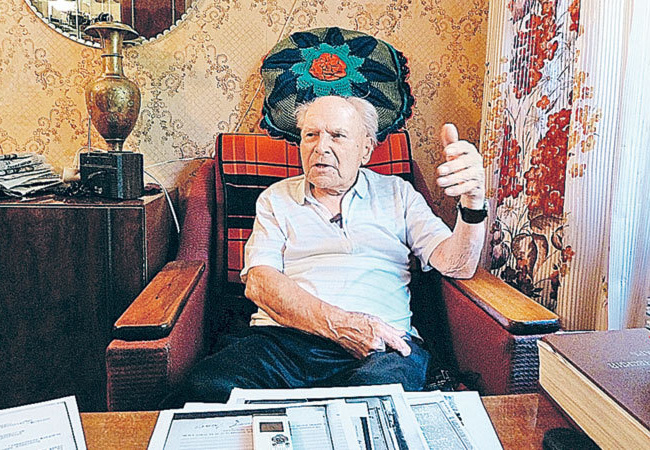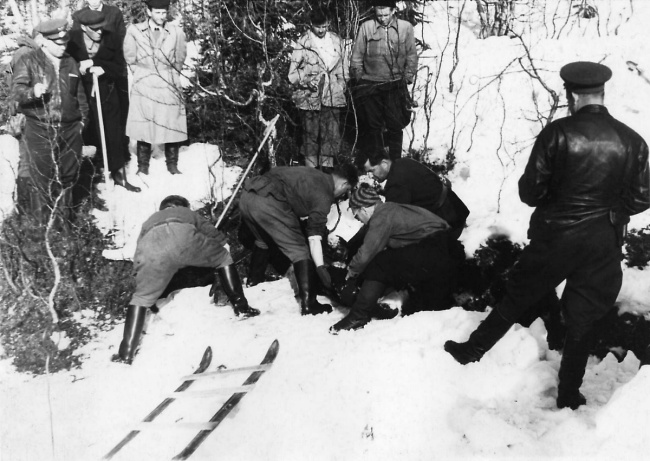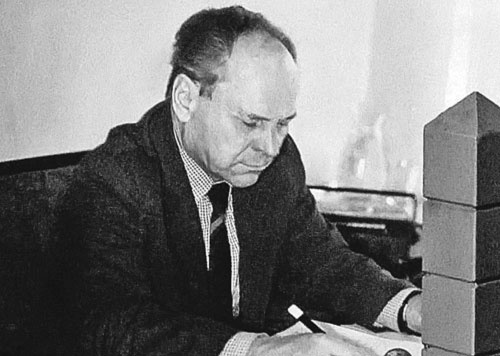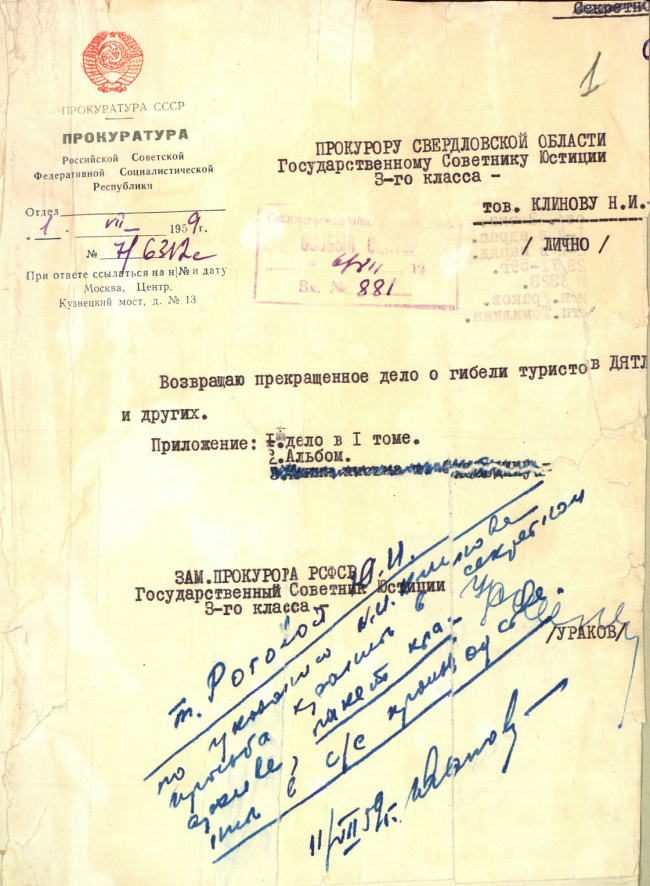
«We were told to say that they were killed in an accident»
Interview with Evgeniy Okishev who supervised the investigation into the death of the hikers in the mountains of the Northern Urals in 1959
August 15, 2013. All rights belong to Komsomolskaya Pravda

The Ural events of 1959 still haunt the former prosecutor Evgeniy Okishev. He is confident that the hikers were victims of military tests.
Correspondents "Komsomolskaya Pravda" continue to investigate the secrets of the Dyatlov Pass, looking for new witnesses of those fatal events. Recall that in the winter of 1959, nine hikers led by Igor Dyatlov disappeared in the mountains of the Northern Urals. A month later, rescuers discovered their cut tent. And within a radius of one and a half kilometers from it - five frozen bodies. The bodies of the rest were found only in May. Almost all the hikers were barefoot and half-dressed. Some have fatal injuries. It is still not solved why the hikers ran away to the bitter cold and their doom.
Evgeniy Fyodorovich is now 94 years. Lives abroad. We will not specify where, in order to save the veteran from private investigators. Despite his advanced age, Evgeniy Fyodorovich remembers those events very well, because in his prosecutor’s practice the case of the death of Dyatlov group became the most mysterious. In 1959, Evgeniy Okishev was the Deputy Chief of the Investigation Department of the Prosecutor’s Office of the Sverdlovsk Region. This is what he remembers.
- When it became clear that the hikers had died, we organised an investigation team under the direction of criminal prosecutor Lev Ivanov, and I was appointed to supervise their work. The impression of the examination of the tent, with its cuts and remains of food inside, was that the hikers had just sat down to supper and suddenly felt panic that made them all rush out. We tried to collect more facts about the Pass. We learned that the location was a sacred site of the Mansi, and that women were not allowed to go there. Since the hikers’ group included two girls, the Mansi were the first we suspected. However this version was soon discarded.
- How did you follow on this version? What made you discard it?
- I called the Ivdel district prosecutor and asked him to find a literate Mansi, an activist with whom I could talk. So, when I came to Ivdel, there were already three Mansi men coming there at the prosecutor’s request, one of them a quite literate person, People’s Deputy to the Regional Council. I had booked a room for the three of them at an Ivdel hotel. But they refused to stay in it. They preferred to sleep outside, in the snow, with their dogs. This is how the Deputy (Mansi) explained it to me: “I ride my sledge dogs even when I go to attend a session of the Regional Council, and I always sleep with them because I feel it hard to stay indoors”. We talked with him about the Mansi and their traditions. He asserted that the place where the hikers died was in no way sacred. On the contrary, any Russian appearing among them would be looked upon as something divine. People would try to touch such a person, make him their guest, as this holds good promise to all. It was absolutely clear from his behavior that the man was telling the truth. After this talk the assassination by Mansi theory became irrelevant. But the question of panic remained. It is worth noting that, for some reason or other, the two men that were found in the forest under the cedar tree had been trying to make a fire for quite a long time: the proof to that was a great number of dead matches found scattered around.
- Do you remember this for sure, had there really been dead matches?
- Absolutely, matches were also mentioned in the on-site inspection report.
- In a month’s time matches should have been covered with snow?
- I believe the inspection report. (The copy of criminal case in the Sverdlovsk archives doesn't mention matches. So, this is one more mystery of the Dyatlov Pass. - ed. note)
«The whole investigation team was checked for radiation»
- Why was the military involved in the search?
- This was on our request. And there were reasons for that. Shortly before that we met with a worker of one of the prison camps in the North Urals. He described strange flashes of light which he and his wife saw late that evening on their way home from the cinema. The light came from the direction of the supposed accident with the hikers. We also received evidence from other local residents, and all of them spoke about a similar phenomenon, all testimonies were entered on our records of interrogation. We got a suspicion of existence of a military test field somewhere around, could that be true? Could flashes be caused by a failed rocket launch that had killed the hikers?
- But, again, there is no such record in the criminal case! So, what happened then?
- A group of the military under the command, if I am not mistaken, of Colonel Artyukov, arrived. I talked to him, and he convinced me that no such facilities were nearby and no possibility of missile launches. But, there was one instance that put us on the alert. When the last bodies were found later in May, an order came to collect all items found at the pass and send them for radiological examination. Also, all people who had been in contact with the things found in the tent and nearby were ordered to undergo body counting.
So it was done, but neither a reassuring, nor any other results were made known to us. And again, the fact of some secret military tests being held was coming to mind. We applied with a letter signed by the Oblast Prosecutor to either the Prosecutor General of the USSR or the Federal – I don’t remember exactly now – asking to explain what really we were investigating into? And how it was related to radiation? Could it be so that even the top commandant of the Urals Military District knew nothing of any tests of armaments held there? In response to our letter, Deputy Prosecutor General, comrade Urakov came to meet with us and gave orders that we were to all tell anyone who asked that the hikers’ death was an accident. Urakov evaded all our direct questions about tests of armaments. I mean, he did not deny this version, but simply avoided direct answers. What’s more, Urakov took absolutely no interest in the course of our investigation, as if the picture of the scene was absolutely clear to him already. He, however, took the case away with him. With that, our investigation came to an end. Just imagine: at the very height of the investigation, when dead bodies with strange injuries have just been found, the case is being taken away! And I clearly remember when we were signing our letter in the office of Oblast Prosecutor Klinov, he himself asked in doubt whether we had omitted something and had not fully checked one or the other evidence? We told him that if the top officials discard the military incident version, then all is left to us is to consider other possible versions. He found our considerations convincing, and signed the letter. But, again, the reaction from Moscow was such that our suppositions of a military involvement had been neither confirmed nor disproved... - What is your opinion, why Urakov ordered everybody to say that was an accident?
- It was, obviously, an order from the CPSU Central Committee.

Search operation in May 1959
- 2 -

Deputy Head of the Investigative Division of the Sverdlovsk Regional Prosecutor's Office, Lev Ivanov's supervisor
Was KGB involved in the investigation?
- Was it possible that other structures did parallel investigations into this case: the KGB, for example, or some other agency?
- I think they had been involved, really, only I was not let in on that. The KGB investigators must have been attracted. Such was the usual practice then. I can even suppose that while we sweated over fact-finding they had already known more – with their powers.
- We have recently got through to the then head of the KGB Investigative department for Sverdlovsk Oblast. The officer’s answer was “we were not engaged in that case, definitely”. He, however, refused to meet with us in person.
- So much for their involvement: why did he refuse to meet with you if the KGB had reportedly not been involved? Why then should he fear to repeat that to you openly? It may well be that his department had really had a hand in the investigation. This is the function of investigators of the Committee (KGB – transl.). Such was their top secret activity. And your interlocutor had simply no right to discuss their work with you.
- Lets say the tragedy was caused by some tests. From the very beginning the KGB performed their own investigation into the case. They quickly find out that, say, the plane had dropped the bomb in a wrong place. A disgrace at government level that must be concealed by all means. It may well be that it was decided to bury the worst injured bodies in four meters deep snow in hope to find some better solution before they are found. Meanwhile the case was assigned to a civilian investigating office, which, on Urakov’s instruction, would file the case away in storage as an accident …
- We can suppose many things here, but I prefer not to, in the absence of facts.
«They called us fascists»
- According to eyewitnesses, when the last bodies were found, prosecutor Ivanov’s behaviour changed abruptly. He looked depressed and in despair. Could this change be related to Urakov’s order to write it all off to an accident?
- I don’t know what to relate it to. We, Ivanov and I, were in a very difficult situation then. Parents of the young people came to my office, some of them cried and called us fascists trying to hide the truth from them. I lost sleep after such charges. But could tell them nothing beside what I was instructed to tell by my superiors. Just imagine the situation; mother or father of a student in my office. They come crying, saying they had lost their only son, or daughter. Like you want to ignore it altogether, don’t do any real investigation, allude to an accident. We told them it might be an earthquake, a storm or anything like that … But look, what else could we tell them? We knew absolutely nothing ourselves. Parents wrote letters to the authorities at all levels, I think, to Khrushchev too, asking for investigation to be continued. The investigation was nevertheless closed – not on our initiative.
- Many people mentioned the unusual red color of skin of the deceased.
- Yes, the skin color was really unusual. Ivanov mentioned this in his report to me. Who else would have known such things if not him, a war veteran and a criminal investigator, he had seen many people frozen to death before. But nothing like this, ever.
- So what could have happened to them?
- I have a strong suspicion, after all those expert examinations (particularly after the radiation analysis made by some order from the top authorities), that there had been tests of some secret weapon or a launch failure. By that time the USSR and the USA had signed the test-ban and nuclear weapons production cut-back treaty. New extra-power devices needed to be created. It may well be that due to special secrecy, tests were conducted at locations unknown to the enemy. The students might have walked into a test area and got injured by fragments of a missile or something of the kind.
- Right, and forensic expert Vozrozhdenniy, too, described heavy injuries as if bodies had been hit by an automobile. So, talking of rocket fragments, where could they have disappeared?
- The military might have collected them.
- And where could the notebooks of some of the hikers have gone? Also the film strips from the hikers’ cameras?
- You are putting me in an awkward position. I would then have to disclose our work methods. There could be anything; withdrawal of documents, other material evidence. Anything that might expose, unfavorably, the involvement of the top authorities had to be destroyed.
- But, at the same time, a few undeveloped films were found left in the tent, and you took them. The military, or whoever else, could not have left a film so you could find it; it could carry shots of military tests.
- It may as well be that no orders were given to doctor the films. The thought is important to take away shrapnels as the most compromizing evidnece. I also admit those people had been in a big hurry and overlooked some details.
- And could it be this way; the KGB officers develop a film and understand there is nothing special on it. Then they superimpose the developed film on the undeveloped one and after exposure obtain a “negative-positive”, develop the second film and again superimpose it on the third one. After exposure the third film presents an exact copy of the original film. This last copy may be loaded back into the camera, and now let the investigator develop it...
- I don’t know how much technically feasible this could be, but it is a fact that the KGB could work miracles in those years. Let me tell you one story. In summer of the same year 1959 Richard Nixon comes to the USSR and visits Sverdlovsk. And there, in Sverdlovsk he asks: May I visit the Beloyarskaya nuclear station construction site. The people who escort him are at a loss; not just myself, but even much higher authorities did not know anything about construction of a nuclear power station in Beloyarka. How could Nixon know about that? And what to do? At last, after consultations with Moscow, the permit is given. So he goes there with a crowd of his journalists. The KGB people somehow manage to arrange it so that not one of them photographs anything. God knows how they did it, closed the lens with their bodies, or what. Nixon photographed too, and who would dare to obstruct the lens for him? He took quite a few shots of different secret facilities. However on the same night his escort persuades Nixon to visit the Russian steam baths, where, needless to say, all steam room attendants happen to undercover KGB officers. So while some attended to him in the steam bath, others spoiled all his films. I heard that later he felt much upset.
- In some sources we read that in the fifties, after Beria’s old guard people were dissolved, the KGB men were no good at all: mostly green and cowed.
- Right, different people could be met in this service then: Baboons after hardly six classes at school, and true professionals as well.
- It is said that had there been any cover-up of the events at the Pass it must have involved many people, and later someone would inevitably have spoken up. But no such testimonies have been made so far …
- But who knows the destinies of, for example, the military men who participated in the search? You don’t? I don’t know either. What has happened to colonel Artyukov, do you know?
- As far as we know, he soon died of cancer.
- There now, make your own conclusions …















